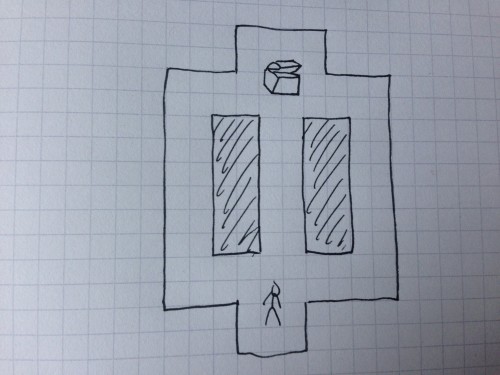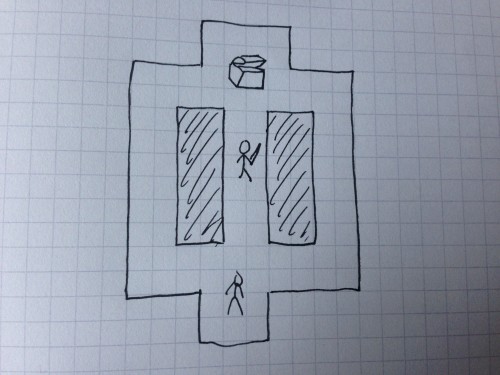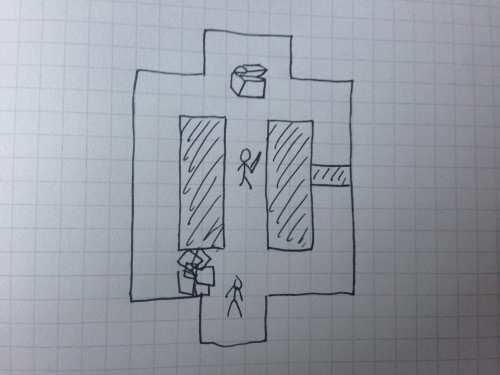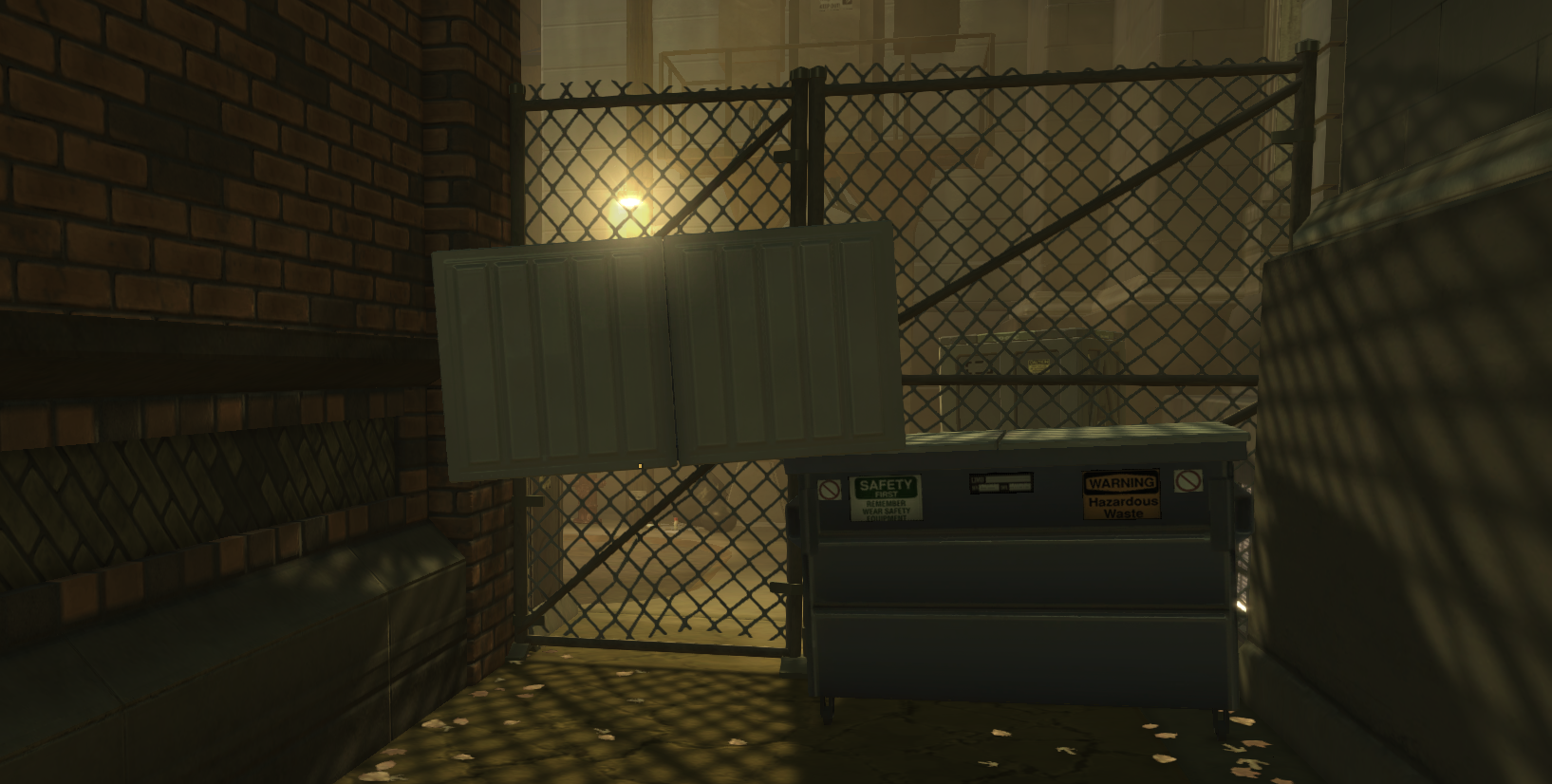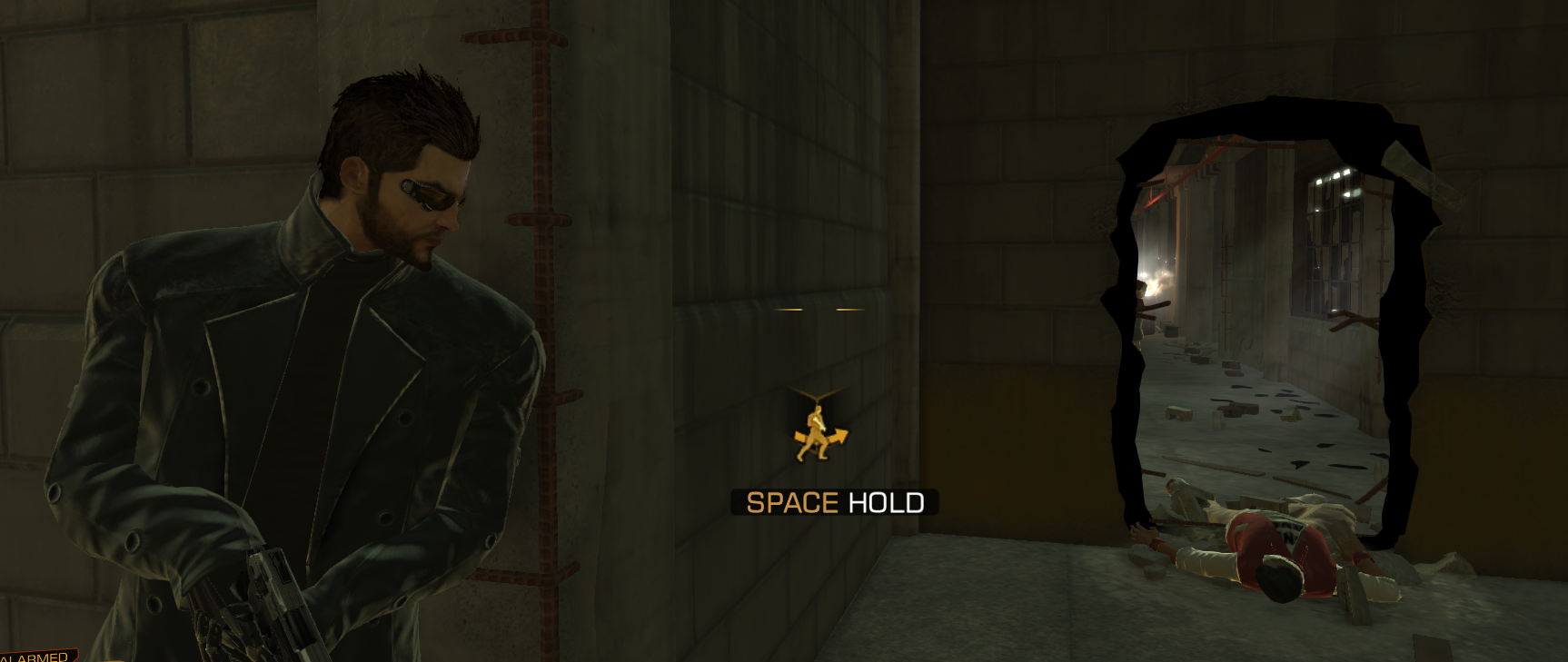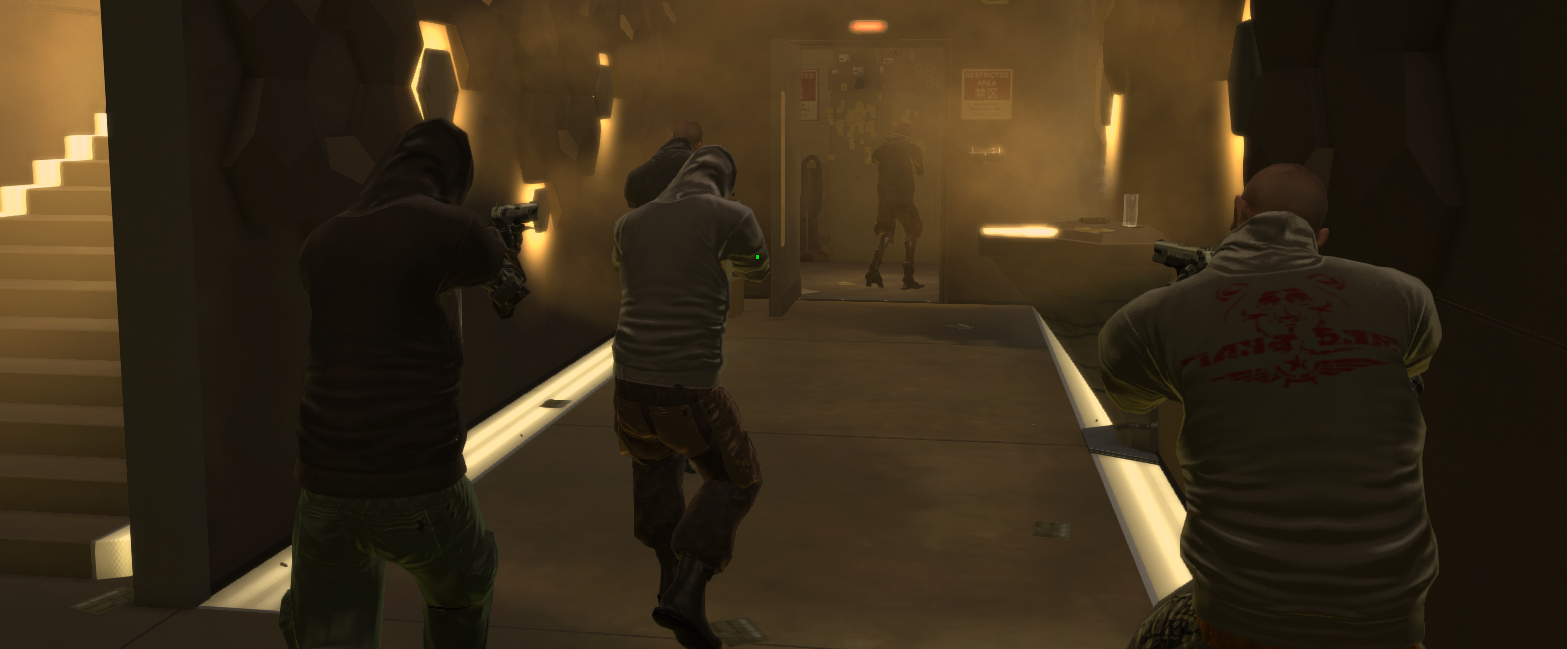TOM FRANCIS
REGRETS THIS ALREADY
Hello! I'm Tom. I'm a game designer, writer, and programmer on Gunpoint, Heat Signature, and Tactical Breach Wizards. Here's some more info on all the games I've worked on, here are the videos I make on YouTube, and here are two short stories I wrote for the Machine of Death collections.
Theme
By me. Uses Adaptive Images by Matt Wilcox.
Search
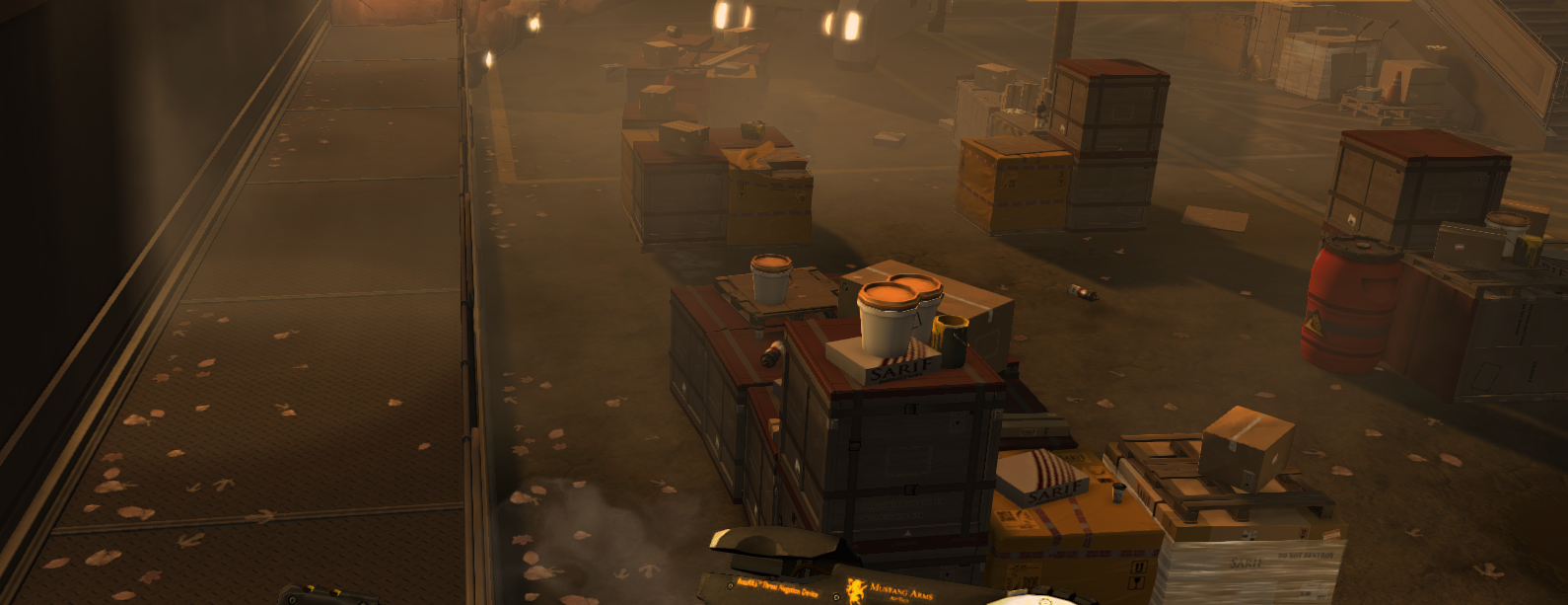
What Works And Why: Multiple Routes In Deus Ex
Deus Ex’s appeal is often boiled down to ‘lots of options’, but obviously that doesn’t quite cover it. Right now I’m looking to redesign the ‘sneaking inside spaceships’ part of Heat Signature, so I need more than a vague line about what’s cool about Deus Ex – I need a practical understanding of specifically why it works, and why similar games don’t. So I’m replaying Deus Ex 1 and 3, to figure out what it is I want to steal. And I think it is options, but it’s not just number. They have to fill a certain set of requirements, and this is my attempt to nail down what those are.
I’ve been mostly playing Human Revolution so far, but I’ll also use some examples for DX1 since there’s so much overlap.
The basic ingredients
We’re talking about ‘ways to achieve your objective’. The objective itself is not optional, or different depending on your play style. Heat Signature does have an element of that, but it’s not what’s interesting about Deus Ex – most of the time, especially in 1 and 3, you have no say in what your objective is. The interesting part is in how you get to it. That generally breaks down into:
Routes: the various paths you can take. Some are easily visible, some might be hidden.
Obstacles: any elements that need to be overcome or avoided on a route – enemies, high walls, locked doors, toxic gas.
Methods: anything that lets you get past an obstacle, including basic skills like sneaking, conventional means like guns, environmental things like a switch, and specialised tools like a hacking upgrade.
Routes require different Methods
This is not interesting:
Multiple routes, but who cares? They’re all the same.
This is more interesting but still pretty trivial:
Multiple routes, but one is clearly more trouble than the others, so the choice isn’t interesting.
This is getting Deus Exy:
Multiple routes, obstacles on all, and each requires a different Method. Do you have a Method for clearing debris? Do you have a Method for dealing with enemies? Do you have a Method for dealing with locked doors? Which brings us to:
The player chooses which Methods to invest in
This is one area DXHR massively improved over DX1. In Deus Ex 1 a single cheap hacking upgrade got you into every computer in the game, and the aug options were binary choices: A or B, where B is often useless. DXHR makes everything Augs, and both unlocking and upgrading them take the same, painfully rare currency. That gives you enormous power to specialise, and also puts enormous weight on those early decisions. The first few Methods you unlock with this system will be all you have, for a time.
I used to think the virtue of lots of routes was that the player always has a big decision to make as they approach each objective. But replaying the Deus Ex games and really examining the situations I find myself in, that’s not it. Most of the time the choice is already made for me by a previous decision about either the playstyle I want to use or the upgrades I’ve picked. If I’ve got the strength upgrade and I’m playing stealthy, when I see a vent blocked by a drinks machine, I’m moving the drinks machine and getting in the vent. I don’t even need to see the other options.
And that’s OK! The actual deciding process is not the sole pleasure of playing a game. A lot of the fun comes in living out your decision, and seeing it rewarded by Routes that it lets you exploit. You got the strength upgrade? Good choice! Now you get to move this heavy thing and access this special route, which is gonna get you close to your objective with minimal resistance. That makes your playthrough feel personal, it makes your choices feel relevant, and it makes you feel clever.
Methods have different Costs
If every obstacle was solved for free by some particular Method, and impassable otherwise, that would probably be OK for a while. But pretty soon your choices would either feel irrelevant (if every Method unlocked a Route) or unfair (if your chosen Methods left you with no Route).
Methods need to have different costs, otherwise unlocking new ones wouldn’t be appealing. Basic sneaking is a Method, but it gets harder and more time consuming to use alone as the game progresses. The kinds of costs Methods can have are things like:
- Resources: blowing up this weak wall uses up a grenade, whereas punching through it with an Aug only takes one rechargable power cell.
- Risk/Skill: you can use this pistol to take out these three guards, but it’s going to be tricky and you’ll die if it fails. If you have a gas grenade, it’s easy and safe.
- Time: if you want to get up to that vent, you’re going to need to scrounge around to find another box you can stack on this one. If you had the jump Aug, it’d be quick.
- Playstyle conflict: yeah, you can probably solve this by just throwing a frag grenade in there. But that’s not who you want to be this time, it’s not how you want to play. You want to do it silently and nonlethally with a tazer and a fridge.
Combat requires a combination of Methods
Combat is special. While it’s technically an avoidable obstacle like the others, almost every playstyle and route involves it at some point, and as players we expect it to be ten times richer and more interesting than any other type. We’re a lot less forgiving of a game that only has one type of weapon than a game that only has one type of lockpick.
This is true for me as much as anyone – every one of my favourite Deus Ex anecdotes involves violence either by or against me. In fact, the first moment that sold me on Deus Ex was getting stuck on a bit with two guards – I couldn’t take them both out before one killed me. Then I realised I could round the corner, spray a fire extinguisher at them both, and shoot them while they choke. It felt like I was fighting against unfair odds, improvising a desperate and clever way to overcome them.
In DXHR it’s less about improvisation, but my favourite thing to do is very similar. Lots of situations involve three guards – I like to stand near two of them, shoot the third in the head with the silenced pistol, then immediately hit the takedown key to use my upgraded close combat move on both the others. It feels like a spectacular explosion of violence, too sudden for anyone to stop and yet almost perfectly silent.
So combat needs:
- The odds stacked against you
- Multiple Methods
- Each Method insufficient alone
- Methods with different strengths
The fire extinguisher can’t hurt anyone, but it can immobilise two people very suddenly without much skill. The pistol can kill in one shot, but only if it’s to the head, and it’s hard to hit a moving head.
If combat tools each have different strengths – range, damage, stun, area, delay – you’re encouraged to come up with some way to combine them to solve the situation at hand, which feels inventive, improvisational and clever.
That’s what I have so far. As with any analysis, it’s not the only way to break it down, and it doesn’t cover everything. I have one more element I want to write up, but I think FTL may be a better example of it, so it feels like a separate post. And if replaying DX1 throws up anything big that this doesn’t cover, that’ll be its own post too.

